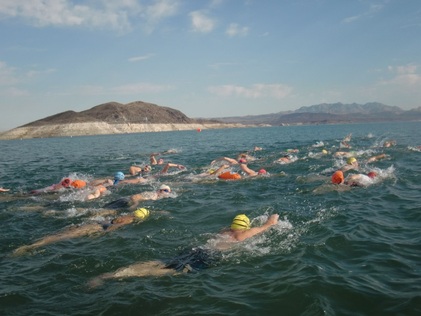Open Water Don'ts — by Coach Kara

As many of you know, open water swimming and triathlon are growing at an unprecedented rate. Certain times of the year, you can find events every weekend. The reasons we race are as numerous as the individuals who participate. With the added popularity comes added responsibility, not only for coaches and race directors but for you, the athlete.
Swim Las Vegas has taken the lead in southern Nevada in providing high quality, affordable & safe coached group swim lessons at the lake. There is a permit involved, certifications and procedures. We want our swimmers to feel safe and confident in the water knowing that we are holding up our end of the bargain. There are some groups in town who don't follow the same protocols. When in doubt, call the National Park Service in Boulder City to see if your "coach" is authorized to be out there.
In March of last year, I represented SLV and attended the Open Water Safety Conference, held in San Francisco. Members of the worldwide open water swimming community met to discuss safety protocols and procedures in response to the death of a national champion, Fran Crippen. As tragic as Fran's death is, it also a wake up call to many people that safety needs to remain a priority. Also close to home are the numerous deaths in triathlon the past years. Many of which happen during the swim.
There are inherent risks involved in everything we do but there is also joy. I believe there is a fine balance of challenging yourself while staying safe. Here are a few suggestions for all athletes to review of what NOT to do on race day.
1. SICK OR INJURED
Sure, we all have a few aches and pains however, if you threw out your back yesterday or just got the flu, do everyone a favor and stay out of the water. WRI’s (water recreation illness) can pass quickly to Don't put yourself and others at risk, especially if you are not feeling 100% both physically and mentally.
2.UNCOMFORTABLE WITH THE CONDITIONS/LACK OF SUPPORT/PROPER MAPS (aka common sense)
Because triathlon and open water races are so popular, many companies are popping up to fill the void. Not all of them are experienced or knowledgeable on how to run a safe race. If the course is unclear, ask questions. If the weather is poor (too hot, too cold, too windy), ask yourself "is it worth it?" There is a difference between using common sense when participating and being too afraid to try. It's a decision each athlete must come to on their own.
3. HAVING A BAD DAY
Sometimes we're just "off" and that's okay. It's important to listen to your body and put your ego aside. Pre-race jitters are normal, but if you are not feeling comfortable about racing that day, don't go and don't beat yourself up about it. Cheer on your friends and enjoy the day.
4. UNDERTRAINED
Adult athletes getting into triathlon or open water swimming need to put in the training hours prior to the event, period. If you haven't trained, you shouldn't race.
5. DRAMA QUEEN
You know who you are: you are under trained, having a bad day, and possibly injured. You can't wait to complain about the event, even though this is your first time in a wetsuit or in open water. You panic and demand that the volunteers in the boats and kayaks keep you company the duration of the event. While it's OK to stop at a kayak during the event for a few minutes, the volunteers are there assist in an emergency. They are not there to be your cheerleader and accompany you for the duration. It's a race after all. If you demand extra attention of rescue boats/kayaks, be prepared to be removed from the course.
There will always be another race, another day to train if you are feeling off. Safety should be your number one priority even if it means a DNS.
Swim Las Vegas has taken the lead in southern Nevada in providing high quality, affordable & safe coached group swim lessons at the lake. There is a permit involved, certifications and procedures. We want our swimmers to feel safe and confident in the water knowing that we are holding up our end of the bargain. There are some groups in town who don't follow the same protocols. When in doubt, call the National Park Service in Boulder City to see if your "coach" is authorized to be out there.
In March of last year, I represented SLV and attended the Open Water Safety Conference, held in San Francisco. Members of the worldwide open water swimming community met to discuss safety protocols and procedures in response to the death of a national champion, Fran Crippen. As tragic as Fran's death is, it also a wake up call to many people that safety needs to remain a priority. Also close to home are the numerous deaths in triathlon the past years. Many of which happen during the swim.
There are inherent risks involved in everything we do but there is also joy. I believe there is a fine balance of challenging yourself while staying safe. Here are a few suggestions for all athletes to review of what NOT to do on race day.
1. SICK OR INJURED
Sure, we all have a few aches and pains however, if you threw out your back yesterday or just got the flu, do everyone a favor and stay out of the water. WRI’s (water recreation illness) can pass quickly to Don't put yourself and others at risk, especially if you are not feeling 100% both physically and mentally.
2.UNCOMFORTABLE WITH THE CONDITIONS/LACK OF SUPPORT/PROPER MAPS (aka common sense)
Because triathlon and open water races are so popular, many companies are popping up to fill the void. Not all of them are experienced or knowledgeable on how to run a safe race. If the course is unclear, ask questions. If the weather is poor (too hot, too cold, too windy), ask yourself "is it worth it?" There is a difference between using common sense when participating and being too afraid to try. It's a decision each athlete must come to on their own.
3. HAVING A BAD DAY
Sometimes we're just "off" and that's okay. It's important to listen to your body and put your ego aside. Pre-race jitters are normal, but if you are not feeling comfortable about racing that day, don't go and don't beat yourself up about it. Cheer on your friends and enjoy the day.
4. UNDERTRAINED
Adult athletes getting into triathlon or open water swimming need to put in the training hours prior to the event, period. If you haven't trained, you shouldn't race.
5. DRAMA QUEEN
You know who you are: you are under trained, having a bad day, and possibly injured. You can't wait to complain about the event, even though this is your first time in a wetsuit or in open water. You panic and demand that the volunteers in the boats and kayaks keep you company the duration of the event. While it's OK to stop at a kayak during the event for a few minutes, the volunteers are there assist in an emergency. They are not there to be your cheerleader and accompany you for the duration. It's a race after all. If you demand extra attention of rescue boats/kayaks, be prepared to be removed from the course.
There will always be another race, another day to train if you are feeling off. Safety should be your number one priority even if it means a DNS.

